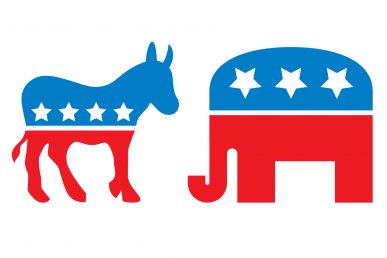Media tap UIC experts for election analysis, expertise

From the coronavirus to social uprisings, 2020 has been a historic year in many ways and the presidential election season joined a long list of the year’s notable happenings.
“Tomorrow is going to be the most important election in our lifetime, no matter what age we are. And secondly it’s going to be the biggest turn out we’ve had in any recent election,” predicted Dick Simpson, UIC professor of political science, during a pre-election interview with FOX 32 Chicago.
Simpson was one of several UIC experts that media outlets sought out to deliver perspective and expertise on various election-related issues leading up to, and after, Nov. 3.
Christopher Mooney, W. Russell Arrington professor of state politics at UIC and the Institute of Government and Public Affairs, told the Chicago Tribune that the leading factor in Illinois voter turnout would be the presidential election and President Trump.
“Presidential elections are totally different than nonpresidential elections. The electorate is different. You get a big chunk of voters that didn’t vote before. They are less interested, less engaged and know less about politics. They’re there to vote for Trump or vote against him,” Mooney said.
Mooney also joined NPR Illinois’ “The 21st Show” to discuss the stakes of this year’s election and WGN-TV Midday News for a segment on Illinois’ graduated income tax referendum, which was turned down by voters.
The highly debated “fair tax,” which aimed to address the state’s budget issues, also brought the expertise of economist David Merriman, to the forefront. Merriman was interviewed my numerous outlets, including the Chicago Tribune, NPR Illinois, WBBM Newsradio, The Pantagraph and Belleville News-Democrat.
“There are other things that could be done to work within the flat-rate tax to make it more progressive, but whether any of it is politically feasible, I don’t know. I mean, legislators have just seen how taxpayers feel about the graduated rate amendment. It may be very hard to convince them to vote for a tax increase,” he told the Tribune.
Zachary McDowell, UIC assistant professor of communication, was interviewed in an article from Vox’s Recode about Wikipedia’s plans to deal with election misinformation.
“Having a critical eye toward information is absolutely imperative right now,” McDowell said.
A WTTW-TV (Channel 11) “Chicago Tonight” election night discussion on the role court cases will play in determining the election results featured Steven Schwinn, professor at UIC John Marshall Law School.
Schwinn later had two appearances on WGN-TV’s Morning News to discuss the latest developments involving the ongoing presidential election vote count and related legal challenges.
“What President Trump and his team seem to be doing here is challenging vote counts in states that they don’t like, but allowing vote counts in states that they do like. Just on the face of this, it doesn’t seem to make any sense,” Schwinn told WGN-TV about President Trump’s legal approach on Nov. 5. “It’s important to remember that the so many of these issues turn on state law and the Supreme Court is going to be loath to intervene on cases that turn on state law.”
As President-elect Joe Biden’s electoral college votes continued to increase, Simpson told NBC 5 Chicago that President Trump’s legal standing to change the outcome was diminishing.
“So far all of the court cases failed to show any significant level of corruption or vote fraud, so the grounds for overturning the election are not there,” said Simpson, who also cautioned that Biden’s transition will be difficult and change will come slowly.
In a pre-election column by the Chicago Tribune’s Jennifer Day, Linda Skitka, UIC professor of psychology, discussed her 2005 study on the display of American flags in 2001 after the 9/11 attacks and the various competing flags and banners visible this campaign season.
“Symbolically, flags are tied to war. It’s symbolic of the culture war in the United States. Which group inside the United States gets to claim the flag?” Skitka said.
The country’s pandemic response, social unrest and overall polarization have left many citizens across the country feeling anxious and stressed. College students, either nationally or from our own campus community, likely share some of these tense and uncomfortable feelings.
With that in mind, several UIC units have organized programs for students to “breathe, reflect, create, process, and be in community.” The Office of Student Leadership and Civic Engagement has created a post-election website that details these events across campus and around Chicago that may be of interest. Information about campus support services and tips for self-care are also offered on the website.
Categories
